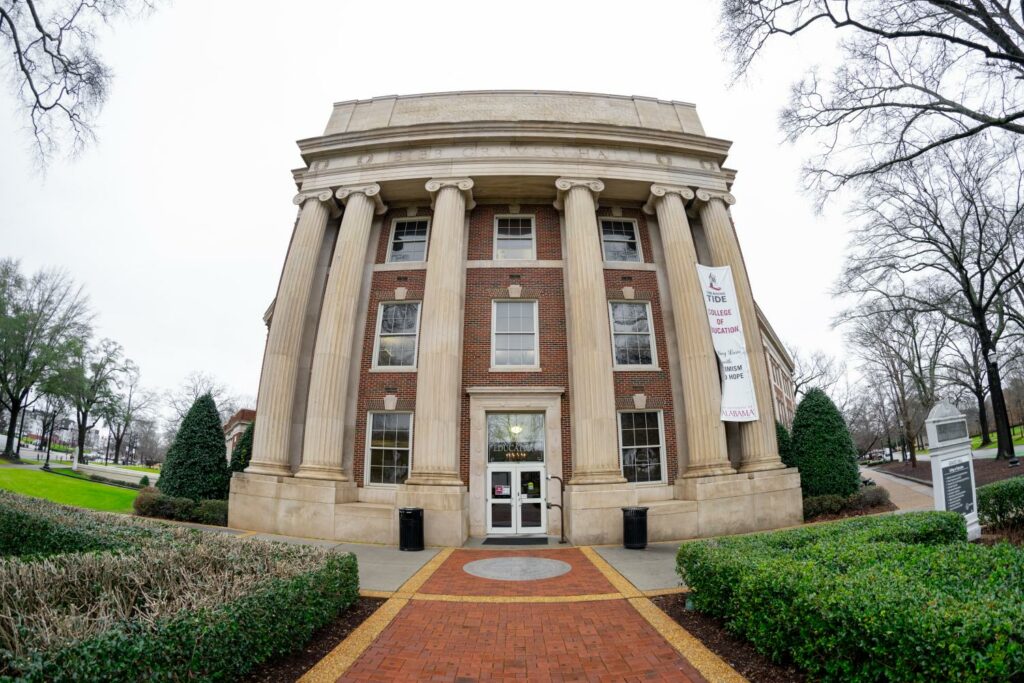Alabama Campus Keeps Klan Leader’s Name on Building, Adds First Black Student’s
A too-small step in the right direction.

As the son of a soldier who became a soldier and then an academic gypsy, I have moved around more than most and have a complicated relationship with “home.” Long ago, I settled on the answer to “Where are you from?” being the place where I finished high school. Thus, Alabama is where I’m from even though I didn’t move there until halfway through my freshman year in high school and I’ve mostly lived elsewhere.
I have additional ties to the Yellowhammer State.* After three semesters at West Point, I finished my undergraduate and master’s degrees at Jacksonville State. And, after four years in the Army, my doctorate at The University of Alabama. And I taught at what was then Troy State University with my good friend and co-blogger Steven Taylor (who has risen to Dean of Arts and Sciences) from 1998-2002. Further, my late parents lived there until their deaths in 2010 and 2018.
That’s a long setup for recent developments at my two alma maters and the school I worked at.
The Crimson White, the student newspaper at Alabama, reports that the school is renaming a prominent building after the first Black student admitted to the Capstone. Alas, they’re doing a very good thing in a not very good way.
Graves Hall, which sits at the southwest corner of the Quad, has been renamed Lucy-Graves Hall.
The University of Alabama Board of Trustees voted to add Autherine Lucy Foster’s name to Graves Hall in honor of the 66th anniversary of her enrollment. Lucy was the first African American student to enroll at the University on Feb. 3, 1956.
The College of Education building was originally named after former democrat, two-term Alabama governor, and Ku Klux Klan member Bibb Graves.
Yes, you read that right. The University has corrected the error of having a building named after a former Grand Cyclops of the Ku Klux Klan for decades by adding the name of a black woman. A worthy one, indeed, and an important recognition of a stain that still tarnishes the school’s reputation:
Lucy, who began her journey at the University on Feb. 3, 1956, completed three days of classes before riots and protests on campus led to her suspension. Trustee Emeritus Judge John England, Jr., chair of the building names working group, told Lucy’s story before the board.
No other African American students attended the University until Vivian Malone and James Hood enrolled in 1963. Their acceptance followed then-Governor George Wallace’s infamous Stand in the Schoolhouse Door.
Lucy opened the door that Wallace sought to symbolically close, England said.
The board considered Lucy for the building name after specific research was done into the history of Graves Hall itself. The resolution presented to the board described Lucy’s experience in Graves Hall, where she hid out from protestors outside the building, as “the site of one of the University of Alabama’s darkest moments.”
Lucy re-enrolled in 1988 after earning a degree in English from Miles College and graduated in 1992 with her master’s degree. She is currently honored by the Autherine Lucy Clock Tower at Malone-Hood Plaza on campus, as well as through her endowed scholarship awarded each year to a Black undergraduate student by the Black Faculty and Staff Association.
As to Graves, well, it’s more complicated than you might imagine:
“On the one hand, Governor Graves is regarded by historians as one of, if not the most, progressive and effective governors in the history of the state of Alabama,” England said. “Some say he did more to directly benefit African American Alabamians than any other governor through his many reforms.”
These reforms included a doubling of education appropriations in his first term, the creation of the Division of Negro Education within Alabama’s Department of Education, the expansion of now-Alabama State University from a two-year to four-year institution and the break up of a longstanding prison labor practice that modeled slavery.
While these were achievements for the state, board members were unable to look past Graves’ conflicting membership in the Klan.
“Unfortunately, that same Governor Graves was associated with the Ku Klux Klan,” England said. “Not just associated with the Ku Klux Klan, but a Grand Cyclops. It’s hard for me to even say those words.”
A Grand Cyclops is a chief officer of a Ku Klux Klan chapter, who appoints others to leadership positions. Graves held this role when he was initially elected as governor.
“We also considered the contributions made and we decided, after much wrestling with it, should this man’s initial and temporary political association with such an organization outweigh the tremendous progress and positive impact achieved? We’re talking about during a time when Alabama was rigidly segregated.”
The working group decided to leave Graves’s name among the two on the building, citing past political motivations as reason for involvement in the Klan. England compared Lucy’s overcoming of racism, segregation and violence, a “sign of the Klan’s defeat,” to Bibbs’ eventual “monumental steps” to resist the Klan, which he was involved with at the start of his career.
“Many historians have concluded that Governor Graves’s association with the KKK was a political maneuver in that it helped Governor Graves along with certain allies such as Hugo Black build a coalition – which included labor unions, prohibitionists, and women’s suffrage advocates – that ultimately helped him secure the 1926 gubernatorial election against the “Big Mules” who dominated state politics in that era,” the board resolution said.
Graves renounced his Klan membership in 1928.
In some ways, this is a Hugo Black or Robert Byrd situation. All three men were Klan members, mostly out of political convenience, but did real good—including for Black people. Because Graves died in 1942, long before the others and decades before Blacks would achieve anything resembling equal citizenship, it’s more challenging to sort out his legacy.
Still, other schools in the state have reckoned with it differently.
Many universities across Alabama bear the name of Graves somewhere on their campus. Some have removed it since the original installment. In 2020 Alabama State University, a historically Black college that he expanded during his governorship, removed Graves’ name from one of their residence halls.
Troy University erased Graves from one of their business college buildings, replacing his name with that of late activist and congressman John Lewis in 2020.
Graves’ name remains on buildings at Auburn University, the University of Montevallo and the University of North Alabama. The University has reaffirmed its commitment to honoring Graves even after extensive review.
In addition, the resolution hinted at future plans for the University of Alabama to “prepare a plaza between McClure Library and Lucy-Graves Hall to memorialize [Foster’s] leadership in overcoming,” what they deemed, “the blight of racial segregation.”
Not mentioned in the piece is Jacksonville State, whose main administrative building when I was on campus bore Graves’ name. A year ago, trustees voted to strip his name from it. Alas, they didn’t rename it after a civil rights icon but after living white alumni who donated a boatload of cash. But the name is gone.
Frankly, I’ve never paid much attention to names. Even though all three campuses I was associated with in Alabama had a Graves Hall, I only vaguely knew that he was a governor a long time in the past. (Troy had buildings named after George and Lurleen Wallace, who I did know.) Ditto Army bases named Benning or Sill or Belvoir. I suspect that’s true of most people. Still, it’s reasonable to think that Black students, faculty, and soldiers who do know see them as not-so-subtle symbols that they’re not fully welcome.
At the same time, as longtime readers know, I’m leery of taking away honors from people who were regarded as heroes and exemplars in their own time because current sensibilities find contemporaneous attitudes they held objectionable. Still, whatever good Bibb Graves did—and it was substantial—it’s hard to justify honoring him on buildings on campuses trying to unburden themselves of the shameful legacy of segregation.
___________________
*The state’s more commonly-used nickname is “Heart of Dixie” which, amazingly, still appears on its license plates to this day, albeit in ever-smaller lettering.






I’m kind of wondering how the University of Alabama student newspaper came to be named “The Crimson White”
@Stormy Dragon: Those are the school colors. Why not “Crimson AND White,” I don’t know.
Where’s that facepalm emoji?
An attempt to satisfy everyone and end up with no one satisfied?
@Stormy Dragon:
When I saw that name, my first thought was “The Radish”? 😀
@James Joyner:
Maybe they hoped to be Harvard South.
We want to encourage people who’ve gone to the dark side to come back to the light. Right? I mean, that’s what we hope for the country that exterminated Indians and enslaved Blacks. Redemption.
It sounds to be as if Governor Graves did what all decent people should do, renounce sin, atone and undo, to the extent possible, the damage they caused. Allowing for redemption isn’t just a gift to the penitent, it’s a gift to society at large in that it shows others a way back to Skywalkerhood. I don’t know why that’s so difficult for a people steeped in the Christian redemption narrative to understand. Continuing to pile contempt on Graves is self-defeating given that Graves did exactly what we hope all bad guys will do. Mary Magdalene, people? Prodigal son? Is it only atheists who read the Bible nowadays?
I’d probably do precisely what the university has done, plus added a plaque to the building giving the information about Graves and the fact that he recanted.
The other question is: how old is the building and how long has the name Graves been attached to it? If it was done only a few years ago, then swap out the names–nobody will care. But if the name has been there for 50 years or more–stick with the Lucy-Graves nomenclature.
(Spoken as someone living in Chicago. Sorry guys–the tallest building downtown will always be called “The Sears Tower”, no matter how long you try to insist it’s The Willis Tower.)
The Klan really does have some of the coolest titles.
Put up a plaque explaining that and be done with it. Part of what they are honoring him for is turning his back on the Klan.
I’m with MR on this one, it feels like SJWs would be creating a bit of a tempest in a teapot if they go hard at trying to scrub Graves’s name from the building. This would just give Fox news more grist for the mill to lecture Fox News watchers about how unforgiving the left is in this country. Can we please try to avoid that this time around.
Also, Michael, it may be that Christians read the Bible but always seem to only focus on their favorite bits (such as whipping out a Leviticus quote when they are trying justify being against LGBTQ+ folks), while an atheist is often the person who could not only whip out that Leviticus quote, but can bring up 4 more passages of the Bible to show that things are not always so black/white in the Bible.
These other passages might open up a Christian’s eyes that the Bible does not just say same person sex bad, stone all homosexuals until they have breathed their last breath, but rather has passages that show there are time to show mercy towards those who are not cut from the same clothes as you are, stuff like that.
@Gustopher:
Did they though? Makes it sound like they’re overcompensating for having gotten banned from the table by all the local D&D dungeon masters for being too racist.
@inhumans99:
Fox will just manufacture something if the overly-sensitive left doesn’t hand them something. We should leave the dude’s name on the building because there’s no good reason to take it off.
This reminds me of the Whoopi Goldberg controversy, where she said something medium-dumb and was suspended for two weeks to “reflect on it.” (And, I think those who are offended by her comments aren’t taking the time to consider how Black folks view history — history is messy and complicated, and whether the Holocaust was racially motivated or religiously motivated is also complicated… viewing it from the outside as White-On-White-Violence doesn’t seem egregious)
I don’t agree with MR’s “the left’s cancel culture is out of control” thing in general, but there are definitely some people who are too happy to take offense. Generally a powerless fringe, by which I mean everyone even slightly to my left.
(Whoopi Goldberg will be fine, I hope she takes the time to reflect upon her misdeeds by a pool, sipping pina coladas and gazing upon the sun-bronzed bodies of cabana boys)
@inhumans99:
It was actually reading the Bible that started me on the road to atheism. The notion that God had inspired that load of gibberish and contradiction, let alone the horrendous depictions of an unhinged, psychopath God, was obviously false.
I wasn’t yet writing (I was in my mid-teens) but no rational person could pretend that Jehovah and Jesus were related, let alone the same creature. The character development is just bizarre. And did God not have an editor? Who the fuck spends chapter after chapter on instantly forgettable genealogies?
The New Testament is if anything even sicker. Oh, sure, I could forgive humanity for doing exactly what I knew they’d do, you know, like people forgive each other day, but somehow I can’t bring Myself to do so unless I kill the kid. Gotta kill the kid or you people all boil in oil for all eternity. And this we call The Gospel – the Good News.
If you cut out all that savage bullshit, Jesus was ahead of his time and said some very wise things. Like, “Let he who is without sin. . .” Except it seems that wasn’t so much Jesus, or even John, but some anonymous scribe who tacked it on centuries afterward.
@Stormy Dragon: Ok, in isolation, sure, they’re tacky, but if they combined those titles with the objectively cool uniforms of the SS… It’s definitely a niche appeal, with some D&D overlap, but it’s pretty good.
It’s also very close to the evil Nazi occultist villains in the Hellboy comics who are hanging out with Rasputin, and those really are very cool.
I agree with Michael, but in a more grumpy way. I find myself wondering if there were any POC in this August body deliberating on Graves sins and redemption? I also find myself wondering why we permanently name anything after anybody. Wouldn’t we all better off if we named them after mountain ranges or lakes or some such? Or, if we have to name it after people, why not change the name every generation or so and make the picking of the new name a way to identify the core values of the institution?
@Michael Reynolds:
And here I thought the “I don’t need to read the Bible. I’m already an atheist” meme was only a snarky put down of scripture. I’d no idea it actually worked that way.
@Kathy:
Ironically, the single biggest cause of me becoming an apostate was joining a Campus Crusade for Christ bible study for one semester in college.
@Stormy Dragon:
Since we’re sharing, the impetus on my part was the ignorance displayed by the all-knowing deity of the Bible, as judged by the state of scientific knowledge decades ago. Only later did I contemplate the morality, or lack thereof, of Jehovah’s actions.
@Michael Reynolds: To reinforce both your argument and Dr. Joyner’s (that Graves’ Klan membership was politically motivated to some degree):
One of the sources notes: “Graves renounced his Klan membership in 1928.”
And Wikipedia notes: “David Bibb Graves (April 1, 1873 – March 14, 1942) was an American Democratic politician and the 38th Governor of Alabama 1927–1931 and 1935–1939,”
I’ll simply go on to note that Graves seems to have renounced his Klan membership in the second year of his first term as governor. The readership is free to draw whatever conclusions it will. I have no knowledge as to qualifications to become the Grand Cyclops of a Klavern.
@grumpy realist:
I’m from Wisconsin, so I know nothing about this Willis Tower you mention. Is it somewhere near the Sears Tower or something? Coming from Wisconsin, would it be better to take the Kennedy or the Eisenhower to get there?
@just nutha: And yes, it’s possible that only atheists read The Bible these days. Especially with the goal of finding out what Christian conduct/practice should look like. We may well have entered a period where large numbers of “disciples” are, to follow Wm. Booth’s metaphor, simply relieved by having been saved and incapable of anything beyond that gratitude.
“Put up a plaque explaining that and be done with it. Part of what they are honoring him for is turning his back on the Klan.”
It certainly may well be part now–and a plaque declaring that might be salutary move–but back when the building was named for him, his Klan cred/renouncement might not have been an issue at all. Lots of buildings have been named for politicians just because that status.
@inhumans99:
FWIW, the person who spearheaded the name change on our our campus was the first Black member of the Board of Trustees (and had been the first Black SGA president when he was a student). He did did not (past tense, as he recently passed away) fit the stereotype of an SJW (he was a very serious and thoughtful person–and since he had a very real lived experience as a Black man from rural Alabama, I think his views on this topic carry a lot of weight).
Speaking for myself, I prefer that we no longer have the most prominent building on campus named after someone who was a Grand Cyclops of the KKK–and I say that understanding Graves’ legacy and all the complications of politics at the time (and let me note that while I understand the point, I cringe at the notion that politician X had to be in the Klan because that is just how things were at the time). His life and legacy are not erased from the history books by removing his name from the building, and I much prefer that building bearing the name of a civil rights icon–it is simply a better message (and also a bit of rectification, since Lewis, who was from Troy, was unable to attend the university in his youth owing to his race).
@grumpy realist:
Actually, if that name was added to the building 50-60 years ago, that’s an argument for changing it as it suggests it was originally named that as an explicit FU to black students right after the school was forcibly desegregated.
@Michael Reynolds:
Yeah. Don’t even need the modifier on it. Freedom and liberty can only be guaranteed by leaving room for contrition and correction.
BTW: the story linked from the newspaper at the time states that Graves resigned from the Klan. It doesn’t actually say anything about renouncing. Indeed, the story notes that Graves did not make any statement, and the piece speculates about why he might have resigned.
@Steven L. Taylor:
I was going to observe that it was the ‘sensuous choice’ but I believe that was a different presentation by the same student.
I think you will find, among both Christians, atheists and even those who are agnostic, quite a few people who don’t read the Bible, and quite a few who do read it, and claim to understand it, but have a very poor understanding of it, and some who read it and have a decent grasp on what’s in there and why.
Being Christian is not a good predictor of who those people are, but then, neither is being an atheist.
@MarkedMan:
More grumpy than me? No. No, I am not having it. I will not be out-grumped.
I gotta say, 2 cute by half. Sometimes the choice is really quite simple. Which side are you on? Picking some imaginary middle ground is just simple cowardice. Chances are real good that in one’s attempts to not piss off either side (and there are sides) trying to keep a foot on both sides just pisses off both. At the very least, neither is going to care much what happens to you.
They would have been far far far far better off renaming it the #17 Building. As is, they are just another armadillo in the middle of the road, waiting for a car from either the left or the right to run them over.
@Stormy Dragon: Also depends on how much the older name has been picked up and used in student lingo.
As an example, Louise Nevelson’s “Transparent Horizons” at MIT was usually called “that big black scrap heap” among students of my generation. There was another piece of art on the campus that was dubbed “melted chocolate pyramids” and then of course we had “The Big Sail” and “The Little Sail” by Calder.
We never had any problems with the naming of the campus buildings because all the buildings on the main campus are numbered. The dorms are named….sorta.
@James Joyner: As I recall, federalism was the sensuous choice in question.
@grumpy realist:
Now I’m reminded of my second year at Penn State. There was a classroom building that had been built three or four years earlier and that had not been named yet and was just called “Classroom Building” by everyone. That summer it had finally gotten a name, but none of the campus maps had been updated, so I actually missed the first day of a class wondering around trying to figure out WTF the “Joab Thomas” building was before finally finding someone who went “Oh, that’s the new name for Classroom Building”
@Steven L. Taylor: That’s right. The same student likened Hugo Black’s membership in the Klan to a social club or some such.